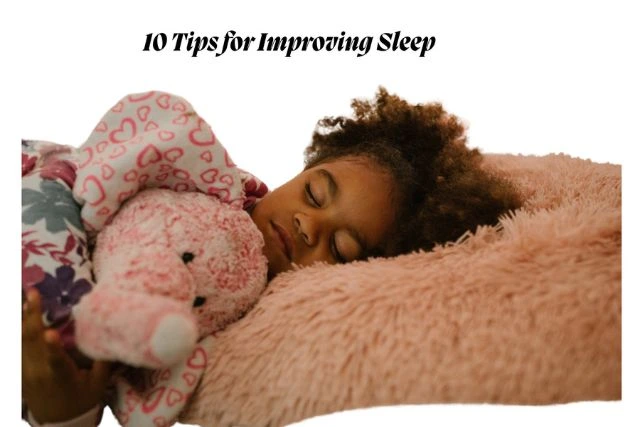Table of Contents
How to improve deep Sleep in Autistic people?
Sleep is a vital component of health, especially for autistic Individuals who may face unique challenges in obtaining the necessary rest. Sleep disorders are common among autistic people and vary from person to person. These disorders may include difficulty falling asleep, frequent night wakings, or poor-quality sleep, often linked to sensory issues, disrupted circadian rhythms, or behavioral difficulties. this article explores 10 tips to improve deep sleep in autistic people, taking into account the specific needs of this neurodevelopmental condition.
1. Establish a Structured Bedtime Routine
One of the keys to improving sleep in autistic individuals is establishing a regular bedtime routine. Autistic children and adults are often sensitive to change and may struggle to adjust to unexpected environments or situations. A predictable sleep routine provides a sense of security and helps reduce anxiety. Here are a few elements to include in this routine:
- A relaxing bath or shower.
- Calm activities such as reading or listening to soft music.
- Relaxation exercises, such as progressive muscle relaxation, to ease physical tension.
- Bedtime stories can be a great way to end the day, but keep them short and simple. Avoid complex or stimulating narratives that could excite the mind, making it harder to fall asleep.
2. Optimize the Sleep Environment
The sleep environment plays a crucial role in promoting restful sleep. Autistic individuals may be particularly sensitive to sensory stimuli, meaning that light, noise, or even the texture of sheets can interfere with their ability to fall asleep. Here are some tips to create a calming sleep environment:
- Dim lighting: Avoid bright lights and opt for soft, adjustable lighting.
- White noise: Use a white noise machine or a fan to mask disturbing external sounds.
- Soothing textiles: Choose bedding and blankets that suit the individual’s sensory needs, such as weighted blankets, which provide a sense of security.
3. Adjust Food Intake Before Bedtime

The foods and drinks consumed before bed can significantly impact sleep quality. Some stimulating foods, such as caffeine or sugar, can disrupt sleep, while foods that promote the production of melatonin (the sleep hormone) can help. Some recommendations include:
- Choose a light snack rich in tryptophan, such as nuts or warm milk.
- Avoid heavy meals, caffeine, and energy drinks several hours before bedtime.
4. Place the Bed Against the Wall for a Sense of Security
Many autistic children and adults find that they sleep better when their bed is positioned against a wall rather than in the center of the room. This setup can help reduce anxiety related to the surrounding space and provide a heightened sense of security. The contact with the wall can also limit visual and auditory distractions, creating a quieter, more predictable environment. However, once the bed arrangement is decided, it is essential not to change the layout of the room during the night. Rearranging the room can be disruptive to an autistic person, who may have to “re-decipher” their environment each morning. This can create additional stress and interfere with the stability needed for restful sleep. Ensure that the layout remains consistent to provide psychological safety and a predictable environment.
5. Use Relaxation and Meditation Techniques
Relaxation is key for autistic individuals, especially those suffering from anxiety. Meditation or deep breathing techniques can be particularly effective in calming the mind and body before sleep. Listening to soft music or soothing sounds can also encourage a state of relaxation conducive to sleep.
- Try meditation apps or videos designed for autistic children or adults, offering simple breathing and relaxation exercises.
6. Light Therapy to Regulate the Circadian Rhythm
The circadian rhythm is the body’s internal clock that regulates the wake-sleep cycle, but it is often disrupted in autistic individuals. This disruption can lead to difficulty falling asleep or waking up during the night. One effective method to address this is light therapy, which helps realign the circadian rhythm. It involves exposing the individual to bright light during the day, typically in the morning. Light therapy can help regulate sleep cycles and promote better rest. It is a non-invasive, natural approach that can be especially helpful for those with sleep challenges. By integrating light therapy, sleep quality and overall well-being can improve.

7. Use Weighted Blankets or Other Sensory Aids
Autistic individuals who are sensitive to touch may find relief from weighted blankets. These blankets apply gentle, consistent pressure, mimicking the feeling of a hug, which can help reduce stress. The calming effect can improve sleep quality by promoting relaxation. In addition to weighted blankets, other sensory aids like pillows or specialized mattresses can be considered to meet individual needs. Each person’s sensory preferences vary, so it’s important to tailor solutions to the individual. Incorporating these tools into a calming routine can support emotional well-being. Creating an environment that accommodates sensory needs enhances comfort and relaxation.
8. Limit Screen Exposure Before Bedtime
Extended exposure to screens before bedtime can interfere with melatonin production, making it harder to fall asleep. The blue light emitted by televisions, tablets, and smartphones disrupts the body’s natural sleep cycle. To promote better sleep, experts recommend limiting screen use at least one hour before bed. Reducing screen time in the evening can improve sleep quality and overall well-being. Creating a relaxing bedtime routine without screens can further support healthy sleep habits.
9. Avoid Psychological or Emotional Stimulants Before Bedtime
Autistic individuals, particularly those with anxiety, may be highly sensitive to stress or stimulation before bedtime. Engaging in stressful discussions or overly exciting activities can increase anxiety and make it harder to relax. It’s important to avoid such triggers in the evening. Instead, focus on calming activities that help reduce mental stimulation. Relaxing routines, such as reading or gentle music, can promote a peaceful state of mind. Creating a soothing environment in the hours before sleep can enhance relaxation. This approach supports better sleep quality and emotional well-being.
10. Consult a Doctor for Severe Sleep Disorders
In some cases, sleep disorders in autistic individuals may stem from underlying issues like behavioral disorders, physical pain, or medical conditions. These factors can disrupt the sleep cycle and cause difficulty falling or staying asleep. It is important to consult healthcare professionals, such as a pediatrician, neurologist, or psychologist specializing in autism, to identify the root cause. They can help determine the most appropriate solutions based on individual needs. Medications like melatonin may be considered to regulate sleep patterns. Professional guidance ensures a comprehensive approach to addressing sleep issues. Exploring treatment options can improve overall well-being and quality of life.
Improving sleep in autistic individuals requires a holistic, personalized approach. Establishing a consistent routine, creating a calming environment, using external cues like bedtime lamps, and maintaining a stable room layout can promote restful nights and enhance overall well-being.
External links: Autism and Sleep

Pingback: Autism Bed for Comfort & Support – Shop Now